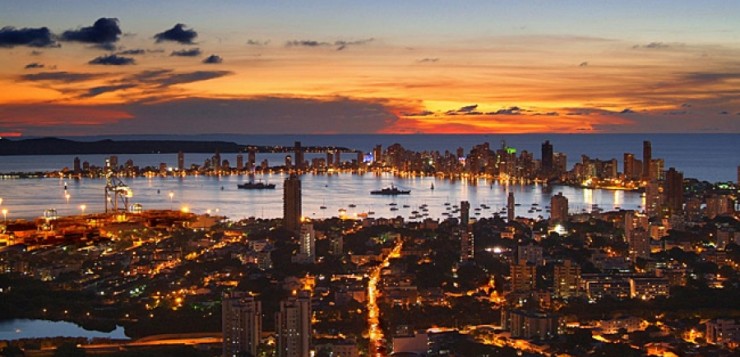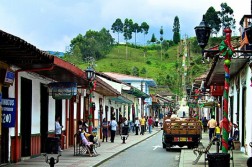Following years in the shadows, Colombia is a nation on the rise. Everyone has heard about its problems – the drug cartels, the decades of civil conflict – but in recent years Colombia has developed into one of South America’s best-kept secrets. There has never been a better time for international students to consider studying abroad in Colombia.
Country Overview
Tropical beaches, rainforests, glaciers, remote deserts, soaring mountains and dynamic cities – you can find it all in Colombia, one of Latin America’s most vibrant and varied nations. If you’re after the bright lights of the big city, look no further than Bogota, one of the largest and liveliest in the continent. If a relaxed pace of life by the sea is more your cup of tea, check out the idyllic beaches of Colombia’s Caribbean coastline. And if you’re a history buff, Colombia’s charming colonial cities and ancient ruins will offer plenty to satisfy your interest.
Merging Spanish, an indigenous and African cultural influence, Colombia is a nation that knows how to party! The world-famous Barranquilla Carnival – second only to that of Rio de Janeiro in the South American carnival calendar – has been designated by UNESCO as one of the Masterpieces of the Oral and Intangible Heritage of Humanity (which, in layman’s terms, means it’s absolutely awesome). Its culture of hospitality towards foreigners means that meeting Colombians might end up being one of the highlights of your time spent studying abroad in this extrovert nation.
For all its natural beauty and charm, it is important to recognize that Colombia has its dark side – its reputation has been tarnished by decades of civil war and violence at the hands of its notorious drug cartels. However, in recent years Colombia has emerged from the ruins to enjoy relative stability. For those who are intrepid enough to head off the beaten track, Colombia is a resurgent nation whose open and expressive culture means international students can be assured of a warm welcome.
Education Overview
Higher education in Colombia has continued to grow and develop in recent years, coinciding with general economic growth and a reduction in crime rates and drug-related violence. Though no Colombian universities made it into the 2015 QS World University Rankings®, Universidad de Los Andes moved up the list to be in the top 300 and has been featured in the rankings for the last eight years. The university also ranked within the top 400 worldwide this year for Engineering and IT, Social Sciences and Management.
Despite not yet making the ranks of the global elite, regionally Colombia has a strong educational reputation. Besides Universidad de Los Andes, the 2015 QS rankings data shows four Colombian universities – Universidad Nacional de Colombia, Universidad de Antioquia, Pontificia Universidad, and Javeriana – all of which finished in the top 500, indicating that with further investment Colombia’s global profile as an international study destination has the potential to grow in the coming years.
Universities in Colombia are divided into public institutions, funded by the state, and private, fee-charging institutions. By the standards of the region, university education is relatively expensive – the average tuition fee is around US$6,000 per year, though private universities can cost up to $14,000. In a country in which the average national wage is $9,200 per year this means university access is largely limited to the affluent, alongside a number of recipients of government or university scholarships.
The vast majority of undergraduate degrees in Colombia fall into one of two categories: the “Profesional”, similar to a bachelor’s degree, requires three to five years of study depending on the program and institution. The other option is a “Técnico” (technician); this degree consists of three years of study and prepares the student for technical or mechanical careers.
All international students will need a visa to study in Colombia.
Pros and Cons
+ Education structure is similar to the US model
+ Universities that rank in the top 300 world wide
+ Top Columbian universities have a good reputation
+ Living costs are some of the lowest in Latin America
– Fees are high for the region
– Numbers of international students are still relatively low (though on the other hand you could see this as a plus!)
International Student Accommodation
Some universities offer halls of residence, but international student accommodation is limited. As the cost of tuition fees is so high compared to the national average wage, it is common for Colombian students to live at home while studying. International students can often find reasonably priced rooms in private accommodation, as well as with host families – advertisements can be found in local newspapers as well as on university notice boards.
Weather/Climate
As Colombia lies on the equator, it has very little seasonal variation in temperature – the difference from winter to summer in Bogota is less than 1°C. There are two seasons: verano (summer) and invierno (winter) – though given that temperatures are almost exactly the same throughout the year, it might be more accurate to refer to them as the dry and rainy season. When and how frequently these seasons occur varies throughout the country. Some areas have two rainy seasons per year, others just one.
As a general rule, low-lying areas are hot day and night, all year round, whereas high-altitude areas are temperate during the day and freezing after dark. At 2,625 meters above sea level, Bogota is the third-highest capital city in the world, so if you are studying abroad in the Colombian capital make sure you pack some warm clothes. The average annual temperature is 15°C, though it drops to about 5°C at night. At sea level the average temperature is closer to 30°C, so pack your beach clothes.
Transport
trains are almost exclusively used for transporting goods; the easiest and cheapest way to get around Colombia is by bus. Each major city has a bus terminal connecting it to other cities, though you may have to change to local services to reach smaller towns and villages. Well-known bus companies include Expreso Brasilia, Expreso Boliviano and Copetran.
Bus is also the primary way of getting around cities, though services are often slow and crowded. In some cities there are bus stops, but in other places you simply flag them down as if you were hailing a cab.
Useful Info
- Dialling code: +57
- Currency: Peso
- Time zone: GMT/UTC – 5 hours
Famous People
- Shakira, pop star
- Sophia Vergara, Actress best known for roll in popular TV show “Modern Family”
- Gabriel Garcia Marquez, Nobel Prize-winning author famous for novels such as 100 Years of Solitude and Love in the Time of Cholera
- Juan Pablo Montoya, Formula One and NASCAR driver
- Juanes, Rock Musician





